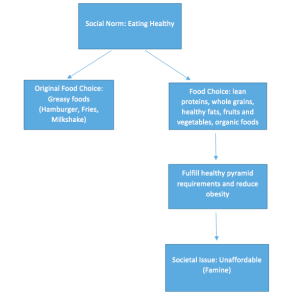Throughout my life I was a very unhealthy eater. It wasn’t until last year when I began training for a marathon with a group of five other guys that my eating habits changed. We all had a certain training schedule we followed. I seemed to struggle a lot compared to them. I didn’t understand because I stretched and did everything the same as them to prepare for every run. It wasn’t until we all ate lunch together one day and I ordered a greasy burger and fries with a milkshake that they noticed what my problem was. I was not getting the right nutrition for running the long miles we were running. All the other boys were snacking on fruits, vegetables, eggs, rice, beans, chicken, ect. They always had a lot more energy than me and felt a lot better at the end of our runs because of the nutrients they were getting throughout the day. I began to change my diet to healthy foods such as lean proteins, whole grains, healthy fats, fruits, vegetables, and I drank a lot more after throughout the day. I began to feel so much more energized and lost a lot of fat and gained muscle throughout my marathon training. The food choice I selected for my social norm was a diet consisting mostly of healthy foods. I was influenced by the five other marathon runners and other athlete diets I read about on the internet.
The social issue with having healthy eating habits is it isn’t always affordable to all people. Healthy foods such as organic food can be very expensive. Being a college student and not having a job it is sometimes very hard to afford the foods I want. This social issue can be connected to famines. Famines don’t necessarily involve the lack of food in an area. In many cases, famines have occurred despite there being no overall food shortages. The food may be located in the wrong place, or it may simply be too expensive to be purchased by those in need. I am not saying that healthy food is a necessity I need at this age, but others who are older or have health issues may need certain nutritional diets that aren’t always cheap and affordable for them. I do believe I should continue the social norm of eating healthy, but I can substitute organic food and other expensive foods with less expensive foods that are still healthy and this will reduce chances of obesity.

Hi, Rachael,
My name is Harrison and I found your post to be very intriguing. For one, I think it is phenomenal that you are training for a marathon! That is something to be proud of. I understand where you are coming from when it comes to choosing the right foods to eat. Prior to college, I competed in short track speed skating on the national level. And, to prepare for Junior World Trials, I had to consume strictly healthy foods such as fruits, veggies, grains, and the right meats to prep my body for competition. The social norms when it comes to these kinds of decisions definitely have weight into what we do personally. Nice job! Here’s a link to my posting: http://geog030.dutton.psu.edu/2016/02/29/food-and-agricultural-the-societal-norms/
Hey Rachael! My name is Cassandra Oresko and I was very interested in your post in regards to how you have changed as an individual to receive the right nutrients. You and I both compare on the aspect of realizing that we weren’t consuming the proper type of food, and from here we changed our eating habits for the better. However, our families contrasted on the idea of eating organic. My family has always taught me to consume this type of food, and though it might be difficult to find in college, I still strive to make healthy, low calorie choices with the right amount in nutrients. Keep running marathons and achieving healthy goals, this was an awesome post. Check out my blog post if you have a chance, I’ve applied many benefits to non GMO food that might catch your interest!
http://geog030.dutton.psu.edu/2016/02/29/cassandra-oresko-module-6-organic-vs-gmos/